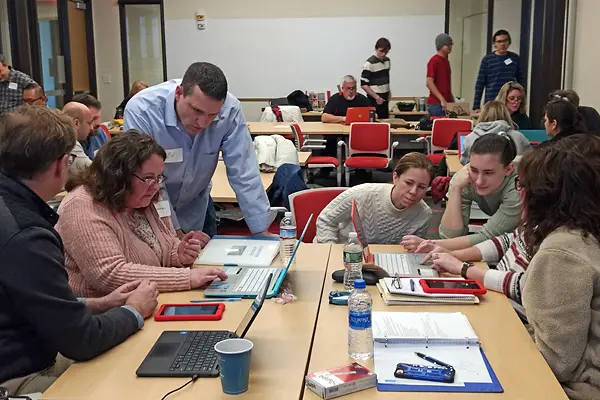Initiative Aims to Build Literacy, Diversity in the Field

UMass Lowell researchers are working with middle-school teachers from Lowell and Methuen to develop a computer science curriculum for their students.
09/10/2020
Contacts for media: Nancy Cicco, 978-934-4944 or Nancy_Cicco@uml.edu and Christine Gillette, 978-758-4664 or Christine_Gillette@uml.edu
LOWELL, Mass. – A team of teachers and researchers led by UMass Lowell is developing a computer science curriculum for middle-schoolers to introduce the field to students from diverse backgrounds.
Called CS Pathways, the project aims to build culturally responsive and sustainable digital literacy and coding programs for secondary students in Lowell, Methuen and Schenectady, N.Y. The initiative’s partners include faculty at UMass Lowell and SUNY Albany, along with middle-school administrators, teachers and parents in the participating communities. A $1.2 million, three-year grant from the National Science Foundation is funding the project.
“Computer science is so important in today’s society that we need everyone to be encouraged to be involved and participate,” said UMass Lowell Computer Science Prof. Fred Martin, associate dean of teaching, learning and undergraduate studies in the university’s Kennedy College of Sciences, who is leading the project at UMass Lowell. “Our goal is to give all middle-schoolers in the partner districts a taste of what the field is about, whetting their appetites to learn more and for them to discover if they have a passion for it.”
Leading the initiative at SUNY Albany is Lijun Ni, assistant professor of computing education.
One of the program’s goals is to be the launch pad for many of these students to go on to pursue computer science in their careers, Martin added. The median annual salary for computer programmers was $86,550 in 2019, according to the U.S. Bureau of Labor Statistics.
CS Pathways builds on work that Martin, a Concord resident, performed with his graduate students and community partners from 2014 to 2017, teaching computer programming skills to middle-schoolers in Everett and Medford. In that project, also funded by the National Science Foundation, students learned coding techniques to create mobile apps for Android phones that supported socially relevant activities important to them, such as how to recognize and help stop cyberbullying.
Everett and Medford have since adopted a computer-science curriculum at the middle-school level. It is a model that could be implemented elsewhere to bring computer science education to even more school districts, according to Martin.
“We reached more than 1,200 kids during our partnership with Medford and Everett. Our vision was to enable students to use computer science as a way of making the world a better place,” he said.
In the new project, UMass Lowell College of Education Assistant Prof. Hsien-Yuan Hsu, an expert in engineering education, and Ph.D. student Bernardo Feliciano of Lowell are evaluating students’ understanding of and interest in computer programming, then collaborating with middle-school teachers to develop lesson plans, according to Feliciano.
“This is the kind of work I got into graduate school to learn how to do,” said Feliciano, who is pursuing his doctoral degree in research and evaluation in education.
The goal of the project is to establish CS Pathways as an official part of the curriculum for all middle-school students, Martin said.
“Computer science is a young field overall, especially in the K-12 levels, and institutionalization is a key challenge,” he said. “We’re working with teachers within the districts and supporting them to become leaders who will carry the project forward after the grant funding period is over.”
Martin has championed computer science education for young learners for many years. In 2015, he served on a panel established by the Massachusetts Department of Education to create state standards for K-12 digital literacy and computer science. The panel’s work was approved a year later and the resulting standards are guiding the adoption of K-12 computer science curriculum throughout the Bay State. Martin is also a past chairperson of the Computer Science Teachers Association, which promotes K-12 computer science education around the world.
UMass Lowell is a national research university offering its more than 18,000 students bachelor’s, master’s and doctoral degrees in business, education, engineering, fine arts, health, humanities, sciences and social sciences. UMass Lowell delivers high-quality educational programs and personal attention from leading faculty and staff, all of which prepare graduates to be leaders in their communities and around the globe. www.uml.edu
